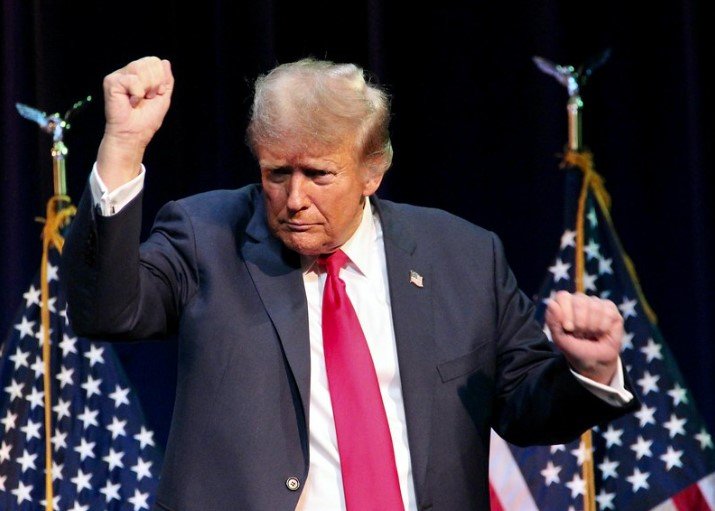The High Stakes in a Post-Election Legal Battle
The Georgia election interference case against President-elect Donald Trump is moving ahead, despite delays and growing doubts about whether it will ever reach trial during his term. While Trump’s recent election victory complicates federal cases against him, the Georgia prosecution stands as a unique challenge—but one that could stretch on for years.
Legal Hurdles: Trial Likely Postponed for Trump
As Trump prepares to assume office, his legal team in Georgia is pushing hard to delay or dismiss the case. Their argument? The responsibilities of the presidency make it nearly impossible for him to attend a lengthy trial in Atlanta without neglecting his official duties. Legal analysts suggest Trump’s co-defendants, who include high-profile figures like former attorney Rudy Giuliani and ex-White House Chief of Staff Mark Meadows, are far more likely to face trial first. Trump himself, though alleged to be the main beneficiary of efforts to overturn the 2020 election results, may evade direct court proceedings for the foreseeable future.
Some experts anticipate that Trump’s lawyers will argue the president’s duty to the country supersedes any state-level prosecution. With cases piling up, the delays aren’t surprising. His co-defendants, many of whom have already pleaded guilty or are cooperating with prosecutors, could see trial dates long before Trump faces the courtroom in Georgia, if ever.

A Shifting Legal Landscape Amid Federal Policy and New Precedents
Trump’s legal challenges extend well beyond Georgia, with federal cases in New York, Florida, and Washington, D.C., now in limbo after his election victory. The Justice Department generally avoids prosecuting sitting presidents, leaving these cases in a precarious position. Federal special counsel Jack Smith, for example, recently paused his election interference case, and is likely to abandon a separate federal case involving classified documents mishandling. This federal restraint on prosecuting a president is underpinned by a long-standing Justice Department memo suggesting criminal prosecution would disrupt executive branch functions.
Trump’s legal counsel in Georgia, Steve Sadow, could rely on similar arguments, even citing the Constitution’s Supremacy Clause, which establishes federal precedence over state law. These defenses, combined with the immunity that some legal scholars believe a sitting president holds, make it unlikely that Trump will face trial while in office.
Questions Over District Attorney Fani Willis’s Role
District Attorney Fani Willis has been a driving force behind the Georgia prosecution since early 2021, focusing on the alleged use of fake electors, voting machine tampering, and other illegal actions. However, her involvement is under scrutiny. Trump’s lawyers will soon attempt to remove Willis from the case, citing a previous romantic relationship with a lawyer associated with the prosecution as a potential conflict of interest. If successful, this disqualification could delay the case further, if not derail it entirely.
Next month, an appeals court will hear arguments on the disqualification motion. A panel of three judges—all appointed by Republican governors—will decide the matter, with a ruling expected by March. Regardless of the outcome, it’s possible that the case may still end up before the Georgia Supreme Court.
Potential Outcomes: Trial Strategies and Supreme Court Decisions
Should Willis remain on the case, she’ll likely have to reconfigure her strategy due to recent immunity rulings by the U.S. Supreme Court. In a controversial decision earlier this year, the Court found that presidents have “some immunity from criminal prosecution for official acts.” As a result, Willis may have to eliminate specific actions taken by Trump after the 2020 election, if they could be deemed “official” under this immunity.
One option on the table is trying the 14 remaining co-defendants separately from Trump. This could pave the way for an earlier trial date, as many co-defendants face similar charges in Arizona, and a few have already attempted, unsuccessfully, to transfer their cases to federal court. If Willis proceeds with a trial for the co-defendants, it may start as early as next year. However, trying Trump himself during his presidency remains unlikely, given the complex legal questions and potential Supreme Court intervention.
- Key Points:
- Willis may issue a new indictment that excludes actions covered by presidential immunity.
- The Georgia Supreme Court could weigh in if Willis is disqualified, potentially invalidating Trump’s indictment.
- Co-defendants, particularly those involved in Arizona election issues, are likely to face trial sooner.
A Possible Supreme Court Ruling on Presidential Immunity?
With three Trump-appointed justices on the Supreme Court, legal analysts anticipate the high court may intervene if Trump’s defense team pushes for immunity. Harvey Silverglate, who represents co-defendant John Eastman, speculated that the Court might postpone any trial against Trump until his presidency ends, aligning with historical precedent. Although a delay might seem likely, it’s worth noting that not all legal experts agree; some believe the Supreme Court could allow state-level prosecutions if there is no direct federal conflict.
Anthony Michael Kreis, a constitutional law expert at Georgia State University, predicts Trump has “absolutely zero” chance of facing trial while serving as president. Still, Trump’s attorneys may leverage a 2000 Justice Department memo that argues prosecuting a sitting president would weaken the executive branch’s ability to perform its duties.
Willis’s Determination Amidst Political Turmoil
Fani Willis has shown resilience in pursuing cases under intense scrutiny. She recently won re-election despite Trump’s pointed criticisms and threats from his supporters. Her past cases, including a high-profile racketeering case involving Atlanta’s Young Thug, have underscored her commitment to seeing difficult cases through to completion.
In an interview last month, Willis reaffirmed her commitment to prosecuting Trump, despite the political consequences. She said that she intends to prosecute “every single case in [her] office,” underscoring her dedication to the principles of democratic justice, regardless of her critics.
On December 5, the appellate court will make a significant ruling on Willis’s ability to continue leading the case, a decision that could set the tone for the years-long legal fight likely to follow.
